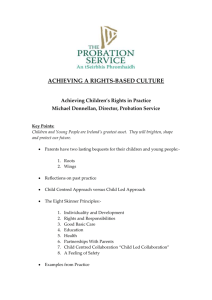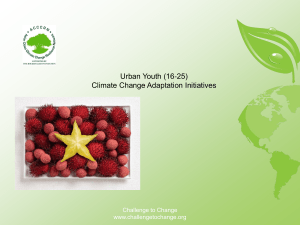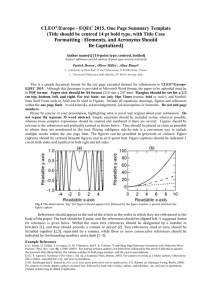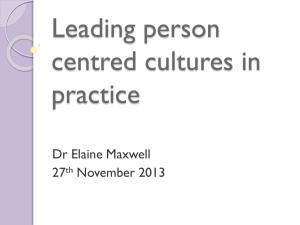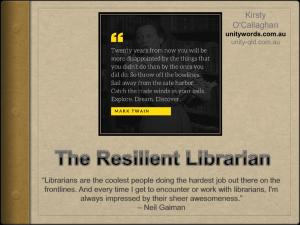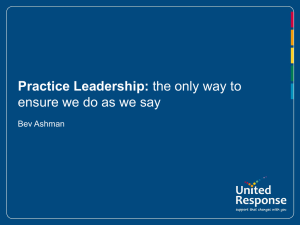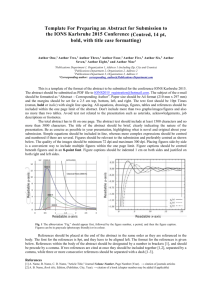Understanding the Challenges in Assessing Young Children
advertisement
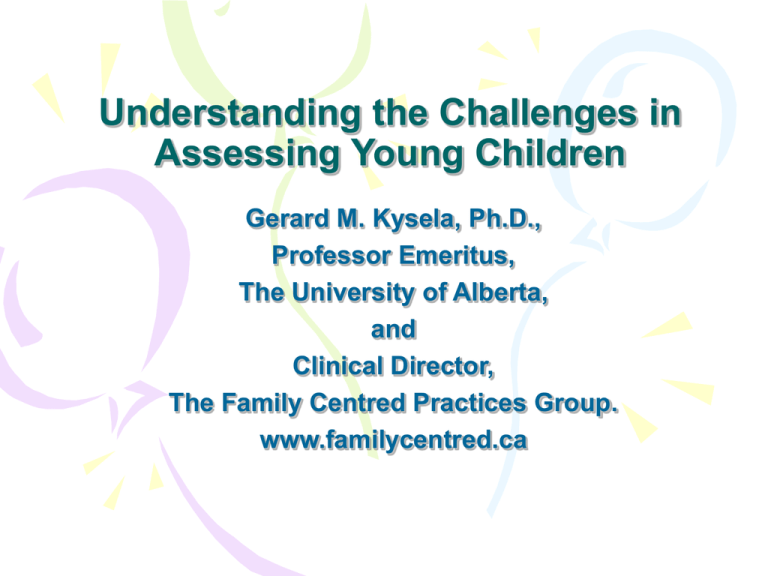
Understanding the Challenges in Assessing Young Children Gerard M. Kysela, Ph.D., Professor Emeritus, The University of Alberta, and Clinical Director, The Family Centred Practices Group. www.familycentred.ca Principles of Family-centred Practice •include families in decision-making, planning, assessment, and service delivery; •develop services for the whole family; •services are guided by families priorities; •families have choice regarding the level of their participation. Presentation Topics •Resilience and Capacity Enhancement; •The Ecological Model; •The Family Adaptation Model; •Family/Child Centred Assessment Practices. Resilience Maintenance of positive adjustment under challenging life conditions A process (not a trait) •Protective processes •Risk processes Why use resilience? •Shifts our consciousness from pathology to capacity •Alerts us to the possibility that positive adjustment processes may differ by environment (challenging life conditions vs typical life conditions) Luther, S.S., Cicchetti, D., & Becker, B. (2000). The construct of resilience: A critical evaluation and guidelines for future work. Child Development, 71(3), 543-562. Protective Processes Individuals Families • • • • • • • • • • • social competence reading skill sense of responsibility problem solving feelings of control plans for future optimism history of success history of + reinforcement seeks support detaches from conflict • • • • • • • • • • • effective parenting attachment warmth and affection cohesive support structure within the family coping skills + expectations of members good partner relationships strong extended family extracurricular activities responsibilities outside the home Mangham, McGrath, Reid, & Stewart, 1994 Protective processes in communities •mutual support •collective expectation of success in meeting challenges •high level of community participation •organize cooperatively •volunteerism •egalitarian treatment of community members •optimism •empowerment (control over policy and programming) Mangham, C., Reid, G., McGrath, P., & Stewart, M. (1994). Resiliency:Relevance to health promotion. Atlantic Health Promotion The Ecological Model of Development Macrosystem Microsystems - Daily Mesosystems - Family School Exosystems - Local Structures Macrosystems - Beliefs and Mores Proximal and Distal Influences Exosystem School Board Workplace Mesosystem Family School Friends Child Day Care Microsystems interactive Industry Dominant beliefs/mores Media The Family Adaptation Model Coping Skills Hassles & Uplifts Beliefs Social Supports Family Adaptation Beliefs and Values (appraisals) Demands FAMILY ADAPTATION Support (community and family) Coping (behavioural) Family Strengths and Resources Family Goals Priority Usual Strategies Used Desired Outcome Who Can Help? Target Date Family/Child Centred Assessment Practices •Family-centered practices are based on the philosophy that a child’s abilities to learn and grow are intertwined with the strengths, needs, and philosophies of their parents and other family members •Goal is to enhance the natural capacities of the family to identify needs/risks, mobilize skills, and set their own priorities for intervention. Common Practices in Family Centred Practices •Inform parents of the purpose and intent of all assessment measures and procedures •Accept direction from families regarding goals for their child, information and resources they need, and priorities they would like to see addressed •Provide a variety of supports that fit with various styles, strengths and preferences •Use clear, jargon-free language as well as helping families become effective communicators Common Practices in Family Centred Practices •Help families view the assessment and intervention process in a positive light •Understand the family within their context and accommodate all individual differences •Value, believe and respect all information that you receive from parents - keep it in the strictest confidence •Help families see similarities between themselves and their peers Practices One Tries To avoid •Invading privacy •Unfairly raising expectations of family members regarding treatment gains •Telling families what they NEED to do •Under-emphasizing the importance of team work •Isolating the child as the client
